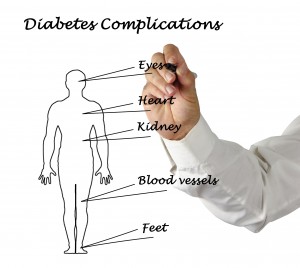Diabetes increases deadly cancer risk by 80 percent
 From the OmniVista Health Learning News Desk
From the OmniVista Health Learning News Desk
A recent study in the journal Diabetes, Obesity and Metabolism shows that diabetes increases your risk of one of the deadliest, most painful types of cancer there is. Pancreatic cancer.
Researchers found that people with diabetes are 80 percent more likely to get this terrible disease. Add pancreatitis (a common complication of diabetes) to the mix, and you’re 12 times more likely to wind up with pancreatic cancer.
These are devastating statistics. Because pancreatic cancer is lethal.
The problem is, a tumor can grow in the pancreas without any symptoms. Which is what makes it so deadly. Very often, by the time pancreatic cancer is diagnosed, it’s already reached an advanced stage.
So it’s critical to keep an eye out for symptoms of pancreatitis (chronic inflammation of the pancreas). The primary symptom is upper abdominal and/or back pain. It can last anywhere from a few hours to a few days at a time. And it typically gets worse when you eat or drink (especially alcohol). These signs may be your only early clue that your pancreas is in trouble.
But here’s the good news: You can reduce pancreatic cancer risk by eating a foods high in vitamin C, E, and selenium.
In fact, according to a study in the journal Gut, one in 12 cases of pancreatic cancer can be eliminated by eating foods rich in these nutrients.
It’s an impressive study. Researchers looked at food journals that 24,000 volunteers kept from 1993 to 1997. In the 10-year follow-up, 49 of those people developed pancreatic cancer. But those with the highest intakes of vitamin C, E, and selenium were 67 percent less likely to develop pancreatic cancer.
So upping your intake of these four essential nutrients should be a top priority. Some of the foods rich in these nutrients include strawberries, bell peppers, brussels sprouts, broccoli, cauliflower, melons, dark leafy greens, tomatoes, nuts (especially almonds, pine nuts, and Brazil nuts), shellfish, and sunflower seeds.
One more note: low levels of vitamin D have been linked with pancreatic cancer. So, once again, be sure to take 2,000 to 5,000 IU of vitamin D3 every single day.
Sources:
“Impact of Diabetes Duration and Chronic Pancreatitis on the Association between Type 2 Diabetes And Pancreatic Cancer Risk” Diabetes Obes Metab 2012; 14(12):1123-8
“Dietary antioxidants and the aetiology of pancreatic cancer: a cohort study using data from food diaries and biomarkers,” Gut 2013; 62(10):1489-96